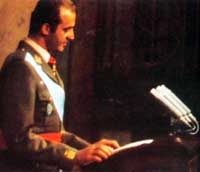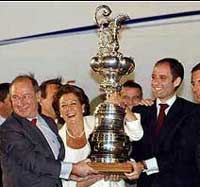|
Democracy, Autonomy and XXI Century Development
1975 to today
 After
the death of Franco in 1975, Juan Carlos - son of Alfonso XII - then in
exile - became the new King of Spain. A new democracy was brewing until
the 1978 Constitution, turning Spain into a constitutional monarchy. After
the death of Franco in 1975, Juan Carlos - son of Alfonso XII - then in
exile - became the new King of Spain. A new democracy was brewing until
the 1978 Constitution, turning Spain into a constitutional monarchy.
Over the course of late 1970s the issue of autonomy was strongly pushed
by Catalunia and the Basque Country. The 1978 Constitution recognised
those two as prime autonomies and 17 other regions as a lesser autonomy,
with much smaller powers. At some point there was talk of annexing Valencia
to autonomous Catalunia, due to extensive cultural ties. This sparked
massive civil unrest in Valencia in 1979, with strong disturbances by
the Valencianist movements. As a result, a new article of the Constitution
was created specifically for Valencia, making it an "in-between"
autonomy - that is with more independence than the 17 lesser autonomies,
but with less powers than Catalunia and the Basque Country.
Thus Valencia once again became autonomous Comunidad Valenciana, for
the first time since the beginning of the XVIII
century. The first elections into the government of the Comunidad
took place in 1983.
In 1981 Valencia had tanks on the streets, in a failed attempt at a coup
d'etat. Milans del Bosch, the then military chief of this third of Spain
happened to have Valencia as his base. As he orchestrated the infamous
hold-up of the parliament on 23 February 1981, he simultaneously mobilised
the armed forces to take the crossroads of Valencia and declare martial
law. However, the coup had so little public support (nor that of the rest
of the military) that not many even got worried. The coup caved in when
the King addressed the nation in the evening and called for the restoration
of democracy. It is important to note that Valencia as a location of the
military mobilisation was a mere coincidence - this is simply where del
Bosch happened to have been appointed and these were the forces at his
disposal. It had nothing to do with the local political climate or leniences
of the Valencians, and the whole city was simply perplexed on their way
to the supermarket and the office.
 Over
the course of 1980s Valencia was under a largely left-wing government,
until in 1991 it swang to favour the right. The conservative government
has been in power ever since, to the present day. Over
the course of 1980s Valencia was under a largely left-wing government,
until in 1991 it swang to favour the right. The conservative government
has been in power ever since, to the present day.
Valencia has entered the 3rd Millenium with full colours, having undergone
another explosive thrust of modernisation, truly turning it into a vibrant
and dynamic XXI century European city over the last 10-15 years. Many
locals will say that 10 years ago you wouldn't have recognised Valencia.
The economy has been steadily rising, mainly due to an expansion in services
and infranstructure, commercial tourism (Valencia is one of the main European
locations for trade fairs and conferences, plus it has an economically
very dynamic coast) and a big bang in construction which has created a
massive property market and attracted much investment. This construction
craze (still very far from the end) has also expanded Valencia territorially
- the city has grown much and the population has now reached 1 million.
Although the agriculture in the countryside is still strong, Valencia
of XXI century is less about that or the industry, and more a major serrvice
provider and a facilitator of international commerce (not to forget that
Valencia has the second largest commercial port in Europe). In addition,
Valencia has shown a spectacular performance as a tourist destination,
with 10 years unbroken growth. Valencia of today has got quite wealthy
and puts a lot of that money into further improvement of public services,
cultural events and projects (more and more international), and a face-lift
to the historical parts of the city, as well as spectacular new projects,
such as City of Arts and Sciences. This is all reminicent of the end of
the XV century Valencia - the Golden
Age.
Yet through all this cyber-age development, Valencia has not simply painted
over its past - it conserved all its traditions intact, and its cultural
identity is still present everywhere. This is why they call it the city
of contrast - you see XXIII century projects side by side with a still
very lively and cared for XIII century church. Valencia is truly marching
into the future while remembering its past, and it gives this city unbeatable
charm as a mutli-purpose tourist destination for all tastes and fancies.
|
|